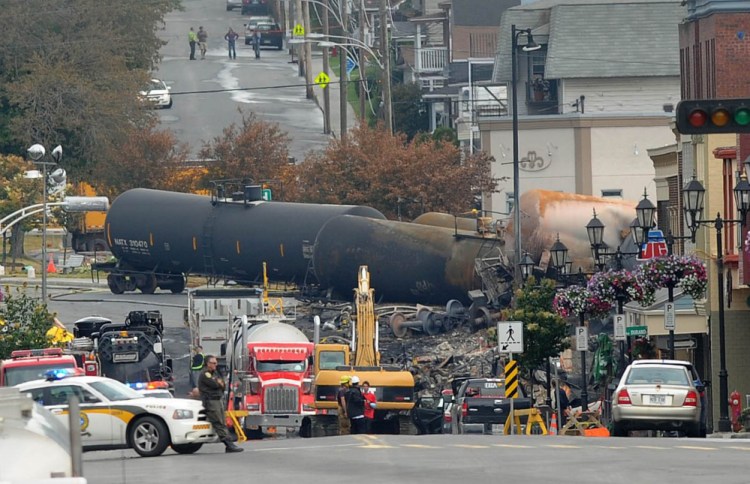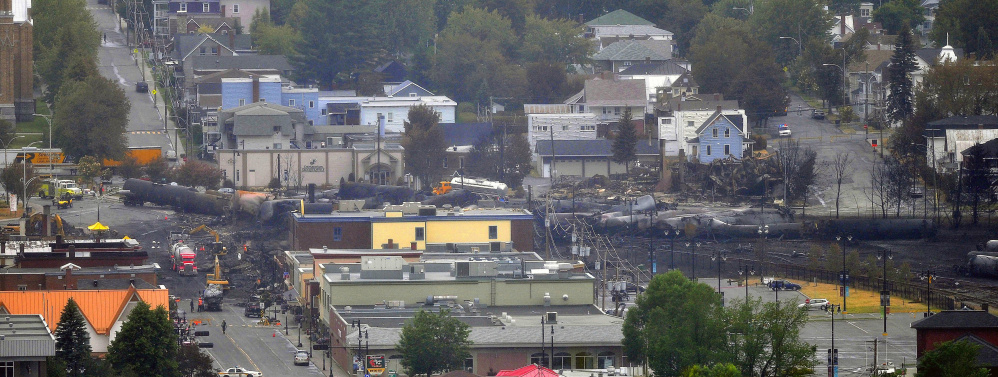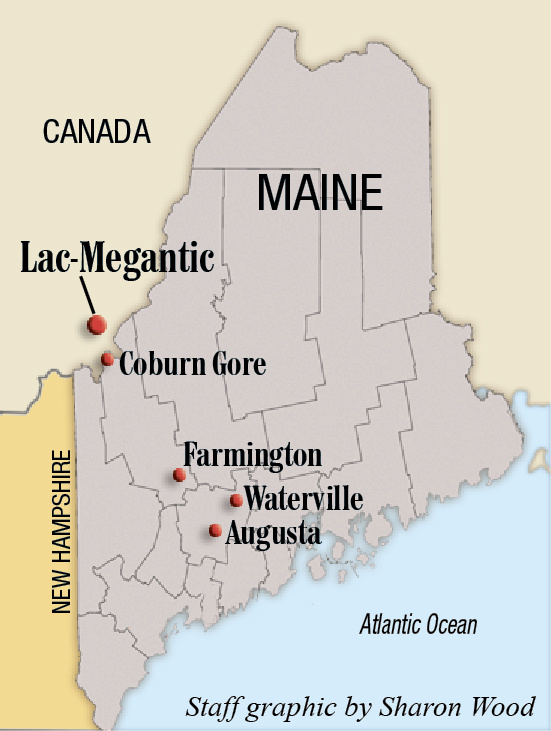Three years after a train derailment and explosion devastated the town of Lac-Megantic, Quebec, a group of Mainers are converging Saturday in Auburn to mark today’s anniversary of the tragedy and reinforce the dangers that the rail transportation of crude oil poses.
Organized by 350 Maine and the Maine Stop Oil Trains Team, Saturday’s event will feature a march by demonstrators on the train tracks in downtown Auburn as well as a vigil in remembrance of the 47 people who died in the Lac-Megantic disaster. The demonstration is scheduled to begin at noon Saturday, with participants meeting at the Great Falls Plaza parking lot.
“After Lac-Megantic, I think we have begun to understand the dangers of oil transportation by train,” said Andy Burt, an organizer behind Saturday’s demonstration and vigil. “We think that it’s really important that the public has a right to know what the risks are to this transportation.”
In the early morning hours of July 6, 2013, chaos and devastation consumed Lac-Megantic when a 72-car freight train carrying about 2 million gallons of crude oil derailed and exploded in the center of the town, located near the Maine border.
Just hours after the 1:30 a.m. explosion, 30 firefighters from eight Franklin County towns arrived in Lac-Megantic — Farmington’s “sister city” — to help.
Three years after making the 93-mile trip with several other Farmington firefighters, Fire Chief Terry Bell said he still thinks about the tragedy. He said the state of the town when he and the others from Maine arrived was “unbelievable.”
Bell and other Franklin County firefighters stayed in Lac-Megantic until about 10 p.m., helping to pump water from nearby Lake Megantic to douse the train cars.
“I’ve always thought about what could possibly happen in this area that could be to that extent, and thankfully I haven’t been able to,” Bell said.
According to the Auburn event’s Facebook page, Saturday’s demonstration will end with a “call to action,” asking government officials to ban oil train transportation in Maine.
The train that derailed in Lac-Megantic was scheduled to cross Maine on its way to the Irving Oil refinery in Saint John, New Brunswick.
While there are reporting guidelines that companies transporting crude oil must file with the state, to date there are no regulations that prohibit the transportation of oil by train, according to the Maine Department of Environmental Protection.
In 2014, Rangeley Fire Chief Tim Pellerin testified before Congress in support of increased hazardous-material training for fire departments after he saw firsthand the challenges emergency responders faced after the Lac-Megantic explosion.
No trains carrying oil have crossed through Maine in 2016 thus far; still, Burt and others against the transportation of oil by train are concerned that tracks go right through central Maine towns such as Aubrun, Lewiston, Waterville, Oakland and Fairfield, where a demonstration was held last year for the second anniversary of the Lac-Megantic derailment.
“Here in Maine, if oil trains start up again, many of them go right through our population centers,” Burt said.
Three years after devastation, Lac-Megantic is still working to rebuild. Though parts of its downtown have been rebuilt, part of it has been gated off since the explosion, according to the Montreal Gazette.
In the wake of the disaster, Farmington officials, groups and residents reached out to help their sister community, including the establishment of a $30,000 relief fund that was given to Lac-Megantic. The Farmington Public Library also held a book drive to raise money for the town’s library, which was destroyed in the explosion.
The Montreal Gazette reported that more than $400 million in settlement money has been collected in civil lawsuits since the derailment and explosion of the freight train, owned by Montreal, Maine and Atlantic Railway.
Lauren Abbate — 861-9252
Twitter: @Lauren_M_Abbate
Send questions/comments to the editors.




